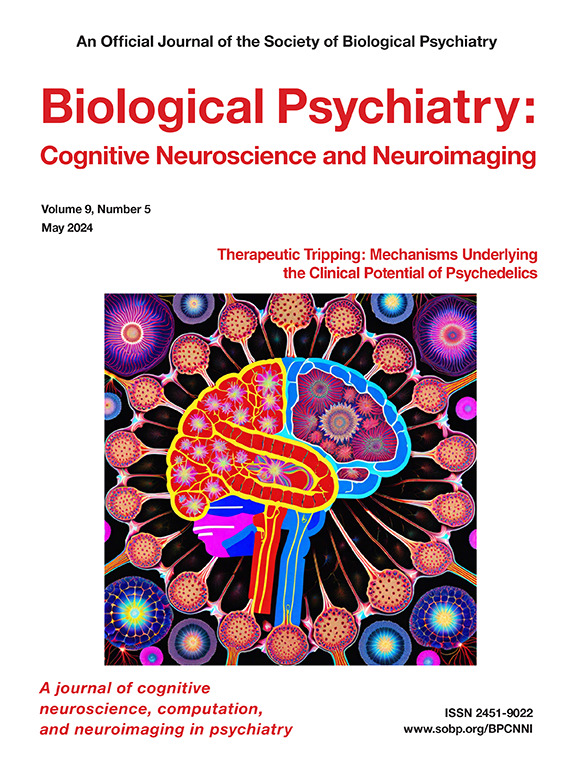认知训练可预防压力导致的工作记忆缺陷。
IF 4.8
2区 医学
Q1 NEUROSCIENCES
Biological Psychiatry-Cognitive Neuroscience and Neuroimaging
Pub Date : 2024-10-01
DOI:10.1016/j.bpsc.2024.06.006
引用次数: 0
摘要
背景介绍工作记忆是一个基本的认知过程,在计划、理解、推理或解决问题时起着至关重要的作用。急性压力已被证明会损害工作记忆。这种由压力引起的工作记忆缺陷对我们日常生活中的认知功能以及与压力相关的精神疾病都有着深远的影响。在此,我们测试了认知训练干预能否使工作记忆更能抵抗急性应激的破坏性影响:方法:在一个预先登记的、完全交叉的受试者间设计中,以压力(与对照组)和认知训练(与假训练)为因素,123 名健康男性和女性(年龄在 18-35 岁之间)完成了为期六周的针对工作记忆相关过程的日常认知训练项目或假训练。在为期六周的训练干预结束后,受试者在工作记忆能力测试前不久接受了标准化的压力或对照操作:结果:正如预期的那样,急性压力导致假训练组的工作记忆能力明显受损。重要的是,尽管两个训练组的主观、自律神经和内分泌压力反应相当,但这种由压力引起的工作记忆障碍在干预训练组被消除了:这些结果首次表明,针对前额叶和海马功能的认知训练干预可以防止应激事件对工作记忆能力的不利影响。本文章由计算机程序翻译,如有差异,请以英文原文为准。
Cognitive Training Prevents Stress-Induced Working Memory Deficits
Background
Working memory is a fundamental cognitive process that is critically involved in planning, comprehension, reasoning, and problem solving. Acute stress has been shown to impair working memory. This stress-induced working memory deficit has profound implications for cognitive functioning in everyday life as well as for stress-related mental disorders. Here, we tested whether a cognitive training intervention would make working memory more resistant to disruptive effects of acute stress.
Methods
In a preregistered, fully crossed between-subjects design with the factors stress (vs. control) and cognitive training (vs. sham), 123 healthy men and women (ages 18–35 years) completed a daily cognitive training program targeting working memory–related processes or a sham training over a period of 6 weeks. After this 6-week training intervention, participants underwent a standardized stress or control manipulation shortly before their working memory performance was tested.
Results
As expected, the exposure to acute stress led to a significant working memory impairment in the sham training group. Critically, although the subjective, autonomic, and endocrine stress responses were comparable in the 2 training groups, this stress-induced working memory impairment was abolished in the intervention training group.
Conclusions
These results are the first to show that a cognitive training intervention directed at prefrontal and hippocampal functioning can prevent the detrimental effects of stressful events on working memory performance.
求助全文
通过发布文献求助,成功后即可免费获取论文全文。
去求助
来源期刊

Biological Psychiatry-Cognitive Neuroscience and Neuroimaging
Neuroscience-Biological Psychiatry
CiteScore
10.40
自引率
1.70%
发文量
247
审稿时长
30 days
期刊介绍:
Biological Psychiatry: Cognitive Neuroscience and Neuroimaging is an official journal of the Society for Biological Psychiatry, whose purpose is to promote excellence in scientific research and education in fields that investigate the nature, causes, mechanisms, and treatments of disorders of thought, emotion, or behavior. In accord with this mission, this peer-reviewed, rapid-publication, international journal focuses on studies using the tools and constructs of cognitive neuroscience, including the full range of non-invasive neuroimaging and human extra- and intracranial physiological recording methodologies. It publishes both basic and clinical studies, including those that incorporate genetic data, pharmacological challenges, and computational modeling approaches. The journal publishes novel results of original research which represent an important new lead or significant impact on the field. Reviews and commentaries that focus on topics of current research and interest are also encouraged.
 求助内容:
求助内容: 应助结果提醒方式:
应助结果提醒方式:


